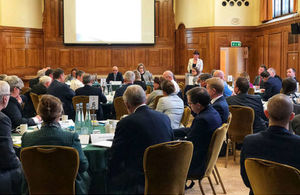News story: Border Force seizes rare live lizard at Heathrow
The juvenile monitor lizard (Varanus Bengalensis), which was about 30cm long, was seen scurrying around the staff area of Terminal 4’s baggage sorting area. It is not known where the reptile’s journey started, but it is believed to be a Bengal variety of monitor lizard.
Officers from the Border Force Convention on International Trade in Endangered Species (CITES) team were contacted following the discovery on Wednesday, 17 January and the reptile was seized under CITES regulations.
Border Force CITES team Higher Officer Jan Sowa said:
Baggage handler staff were probably quite amused when they saw this lizard on the loose, but this could easily have ended tragically.
We don’t know for sure, but we think the reptile may have been placed in luggage in an attempt to bring it into the UK illegally. This must have caused it considerable distress so it’s a miracle it did not die from shock, the cold or being run over.
Border Force’s specialist CITES team takes its role in preventing illegal wildlife trafficking very seriously and, working together with our partners in the UK and internationally, we are determined to bring it to an end.
The reptile is being housed at a specialist centre near Heathrow while the CITES team make efforts to find a suitable home for it.
Monitor lizards take several years to reach adult size but once fully grown they can be up to 2 metres long. Juveniles are usually fed on a diet of crickets.
The Border Force CITES team, based at Heathrow but covering the whole of the UK, are highly regarded specialists in the field of endangered species and work closely with the National Wildlife Crime Unit, National Crime Agency and police forces on investigations and provide expert advice on import and export issues.
They also act as the main point of contact for other enforcement agencies and non-governmental organisations in endangered species-related issues.
